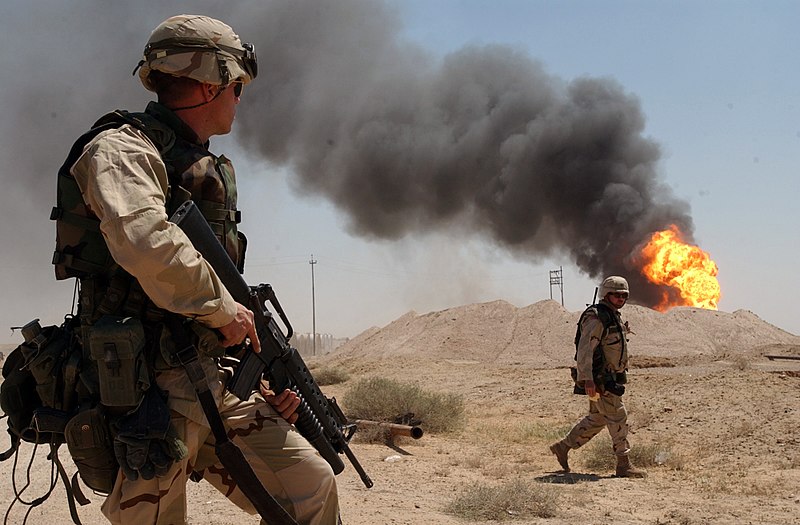Many of our readers fought in this war and don’t need a rundown of events, but as the days stretch on, it draws further and further away. Many of today’s youth may be too young to remember — today’s 18-year-olds were only three years old at the beginning of the war.
On March 20, 2003, the United States kicked off Operation Iraqi Freedom as they poured troops across the border and into the country. Special Operations units had already been working in the area — some as early as the March 17, many on March 19. The U.S. was joined by the British, Polish and Australian militaries, and they moved quickly through Iraq, their areas of operation softened by airstrikes and indirect fire. By April 9, Baghdad was taken. In the ensuing years of fighting, many more countries would find themselves involved in the conflict in one way or another, and the majority of coalition casualties would occur after the completion of the invasion.
The definition of what constitutes winning a war is often debated, especially in the instance of the war in Iraq. If it means that all fighting ceases and peace across the board is attained, then victory was not achieved by the time coalition forces controlled the country. If victory meant the occupation of all land and formal enemy forces had been subdued and/or defeated, then it was achieved. On May 1, 2003, President George W. Bush gave his “mission accomplished” speech that would garner a lot of controversy, though he never actually said “mission accomplished” in his speech (it was written on a banner on the carrier he was speaking on).
The “victory” speech would be one of many points of controversy throughout the duration of the war. As it progressed, the international community would become very critical of the U.S. involvement in Iraq, though polls throughout Iraq itself were not so clearly in the opposition. The conflict would stretch out for almost nine years before the U.S. pulled the majority of its forces out in December of 2011.
According to UK Prime Minister Tony Blair and U.S. President Bush, the coalition’s aim was to “disarm Iraq of weapons of mass destruction, to end Saddam Hussein’s support for terrorism, and to free the Iraqi people.”
Many of the battles would become important battles in SOF history. For example, the battle of Haditha Dam involved Rangers from 3rd Ranger Battalion, 75th Ranger Regiment, as well as elements from Delta Force. The rescue of Jessica Lynch also occurred during this time, consisting of Rangers, SEALs, PJs, Marines and other supporting elements. SOF units were active throughout the country, consistently playing pivotal roles in a conflict of this nature.

President George W. Bush on the invasion of Iraq:
Good morning. American and coalition forces have begun a concerted campaign against the regime of Saddam Hussein. In this war, our coalition is broad, more than 40 countries from across the globe. Our cause is just, the security of the nations we serve and the peace of the world. And our mission is clear, to disarm Iraq of weapons of mass destruction, to end Saddam Hussein’s support for terrorism, and to free the Iraqi people.
The future of peace and the hopes of the Iraqi people now depend on our fighting forces in the Middle East. They are conducting themselves in the highest traditions of the American military. They are doing their job with skill and bravery, and with the finest of allies beside them. At every stage of this conflict the world will see both the power of our military, and the honorable and decent spirit of the men and women who serve.
In this conflict, American and coalition forces face enemies who have no regard for the conventions of war or rules of morality. Iraqi officials have placed troops and equipment in civilian areas, attempting to use innocent men, women and children as shields for the dictator’s army. I want Americans and all the world to know that coalition forces will make every effort to spare innocent civilians from harm.
Already have an account? Sign In
Two ways to continue to read this article.
Subscribe
$1.99
every 4 weeks
- Unlimited access to all articles
- Support independent journalism
- Ad-free reading experience
Subscribe Now
Recurring Monthly. Cancel Anytime.
A campaign on harsh terrain in a vast country could be longer and more difficult than some have predicted. And helping Iraqis achieve a united, stable, and free country will require our sustained commitment. Yet, whatever is required of us, we will carry out all the duties we have accepted.
Across America this weekend, the families of our military are praying that our men and women will return safely and soon. Millions of Americans are praying with them for the safety of their loved ones and for the protection of all the innocent. Our entire nation appreciates the sacrifices made by military families, and many citizens who live near military families are showing their support in practical ways, such as by helping with child care, or home repairs. All families with loved ones serving in this war can know this: Our forces will be coming home as soon as their work is done.
Our nation entered this conflict reluctantly, yet with a clear and firm purpose. The people of the United States and our friends and allies will not live at the mercy of an outlaw regime that threatens the peace with weapons of mass murder. Now that conflict has come, the only way to limit its duration is to apply decisive force. This will not be a campaign of half-measures. It is a fight for the security of our nation and the peace of the world, and we will accept no outcome but victory.
Thank you for listening.”
Images courtesy of Wikimedia Commons.











COMMENTS